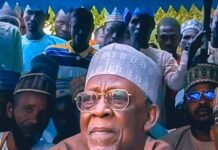Re: APC governors, the CPC power bloc, the future of Nigeria and the politics of 2027, by Engr. Bello Gwarzo Abdullahi, FNSE
In his eloquently crafted piece entitled “APC Governors, the CPC Power Bloc, the Future of Nigeria and the Politics of 2027,”Comrade Sanusi A. S. Maikudi embarks on a profound exploration of the significant matters surrounding the forthcoming 2027 elections. The discourse traverses a plethora of critical issues that possess far-reaching implications.
Each historical epoch—whether social, political, economic, or religious—presents challenges that necessitate resolution in alignment with the prevailing conditions. The ascendance of PBAT’s administration, akin to its predecessors, is fraught with its own distinct challenges, which are currently under scrutiny in an endeavor to ascertain how the nation can extricate itself from these predicaments.
Since its inception, two pivotal issues have delineated the trajectory of the administration: the rescission of the petroleum subsidy and the liberalization of the national currency. The ramifications of these decisions reverberated like a thunderclap, thoroughly dismantling the “Renewed Hope”narrative while concurrently engendering new challenges—accusations of cronyism, imbalances in appointments to key positions, and the suppression of dissenting voices.
The recent pilgrimage of 21 APC governors to Kaduna, seeking the endorsement of former President Buhari for President Tinubu and the APC in the impending elections, signals that discontent pervades the ruling party. This maneuver transpired despite their prior repudiation of the CPC bloc. To the discerning observer, this action was propelled by several critical factors that underscore the prevailing discontent with the existing circumstances.
The encroachment of the Federal Government upon state jurisdictions, despite the federal nature of our constitution, has raised alarm bells among the governors, illuminating a broader issue of centralization of authority that jeopardizes the autonomy of regional entities. Furthermore, the erosion of democratic principles at the state level—exemplified by the political turmoil in Rivers State—has exacerbated the governors’ trepidations.
The flagrant disregard for democratic norms, neglect of due process, and the compromised judiciary, compliant legislature, and dictatorial executive have fostered a climate of unease among stakeholders, prompting them to seek alternative avenues to counter the insidious descent into authoritarianism.
Instead of addressing these challenges, the disparaging rhetoric emanating from the Presidency, aimed at former leaders and stakeholders, has further widened the chasm between the governors and the central government. Rather than cultivating dialogue and collaboration, the rhetoric from the upper echelons has proven divisive, straining relationships within the political sphere.
READ ALSO: Challenges and opportunities of livestock practice in Nigeria, by Engr. Bello Gwarzo Abdullahi, FNSE
Moreover, the neglect of critical infrastructure projects, such as the Abuja–Kano Federal Highway, coupled with the opacity surrounding the announcement of new initiatives, has intensified the governors’ discontent. The failure to address fundamental infrastructure needs and the lack of transparency regarding governmental projects have raised profound questions about the priorities of the current administration.
The unconstitutional enactment of legislation within the National Assembly without proper deliberation has emerged as another point of contention for the governors. The absence of due process and unilateral decision-making underscore the urgent need for a more transparent and inclusive governance framework.
Additionally, the schism within the Northern support base, with prominent figures aligning themselves with opposition parties due to dissatisfaction, has further complicated the political landscape. The shifting allegiances and fragmentation of traditional support networks have introduced an element of unpredictability into the forthcoming elections.
Furthermore, the marginalization of civil servants and pensioners—characterized by inadequate remuneration and the failure to implement minimum wage adjustments, the escalating cost of living, and the profligacy of the political class—has illuminated the governance challenges confronting the nation. The neglect of essential workforce sectors and the lack of attention to their welfare have raised pressing concerns regarding the government’s commitment to its citizenry.
In light of these pressing issues, it is imperative for the government to recognize that support is earned and loyalty cultivated through addressing regional disparities, respecting opposition parties, and fulfilling fundamental governance responsibilities. Building trust and fostering inclusivity are paramount in securing the allegiance of the populace.
As we gaze toward 2027, the emphasis on capable, inclusive, and equitable leadership to safeguard Nigeria’s future is paramount. The appeal for the Tinubu presidency and governors to prioritize trust-building over political maneuvering serves as a poignant reminder of the importance of integrity and transparency in governance. The pathway to a stable and prosperous future lies in upholding democratic values, addressing critical issues, and engaging in meaningful dialogue with all stakeholders.
Based on the issues raised and the political machinations underway, 2027 promises to unveil surprises. It is hoped that this will foster an environment conducive to the sustenance of democracy. The current state of affairs offers little hope, and the sooner those wielding power comprehend this reality, the better.
Moreover, the discourse surrounding infrastructure development and governance transparency underscores the fundamental challenges facing the nation. The neglect of critical projects and the lack of accountability in decision-making processes have sown seeds of discontent among stakeholders, necessitating a reevaluation of governmental priorities and practices. The call for inclusive leadership and earned support resonates as a clarion call for a more equitable and responsive governance framework.
Looking ahead to 2027, the landscape of Nigerian politics stands at a crossroads, brimming with uncertainty and potential. The need for dialogue, collaboration, and a renewed commitment to democratic values has never been more pressing.
The forthcoming elections hold the promise of change and renewal, provided that key stakeholders prioritize the interests of the nation above personal agendas. The future of Nigeria hinges on the ability to navigate these complex issues with integrity, foresight, and steadfast dedication to the well-being of its citizens.
bgabdullahi@gmail.com
Follow the Neptune Prime channel on WhatsApp:
Do you have breaking news, interview request, opinion, suggestion, or want your event covered? Email us at neptuneprime2233@gmail.com





